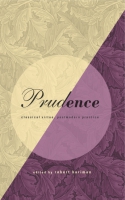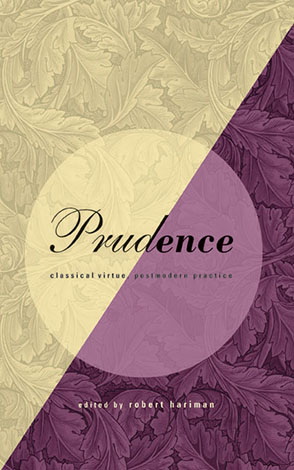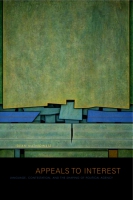Prudence
Classical Virtue, Postmodern Practice
Edited by Robert Hariman
“The diversity of the subject matter and historical context might seem eclectic, but the volume is nonetheless more coherent than many collections of essays dealing with a single historical period. Not only does it remain focused throughout on the topic at hand, but its more rhetorical, less philosophical, perspective on prudence and practical wisdom gives it a definite cogency and originality. More importantly, one finds throughout an obviously sincere desire to investigate the relevance of prudence for our present state of affairs. His knowledge and mastery of the literature and various perspectives on prudence is impressive. His critical attitude is all the more praiseworthy in view of the fact that he never ‘gives in’ entirely to one contemporary theoretical perspective, be it the civic republicanism of a Beiner, the loftier logic of interpretation of a Gadamer (which he terms ‘bourgeois prudence’) or the ‘avant-garde prudence’ of post-structuralist thinkers such as Lyotard. As befits his subject, he is always conscious of limits and context. His ability to relate classical or early modern aspects of prudence to contemporary perspectives such as ecology (or the Monica Lewinsky scandal!) is also notable, through some more recent historical events might have been even better fodder for such analysis.”
- Description
- Reviews
- Bio
- Table of Contents
- Sample Chapters
- Subjects
This volume brings together scholars in classics, political philosophy, and rhetoric to analyze prudence as a distinctive and vital form of political intelligence. Through case studies from each of the major periods in the history of prudence, the authors identify neglected resources for political judgment in today's conditions of pluralism and interdependency.
Three assumptions inform these essays: the many dimensions of prudence cannot be adequately represented in the lexicon of any single discipline; the Aristotelian focus on prudence as rational calculation needs to be balanced by the Ciceronian emphasis on prudence as discursive performance embedded in familiar social practices; and understanding prudence requires attention to how it operates through the communicative media and public discourses that constitute the political community.
Contributors, besides the editor, are Stephen H. Browne, Robert W. Cape Jr., Maurice Charland, Peter J. Diamond, Eugene Garver, James Jasinski, John S. Nelson, and Christine L. Oravec.
“The diversity of the subject matter and historical context might seem eclectic, but the volume is nonetheless more coherent than many collections of essays dealing with a single historical period. Not only does it remain focused throughout on the topic at hand, but its more rhetorical, less philosophical, perspective on prudence and practical wisdom gives it a definite cogency and originality. More importantly, one finds throughout an obviously sincere desire to investigate the relevance of prudence for our present state of affairs. His knowledge and mastery of the literature and various perspectives on prudence is impressive. His critical attitude is all the more praiseworthy in view of the fact that he never ‘gives in’ entirely to one contemporary theoretical perspective, be it the civic republicanism of a Beiner, the loftier logic of interpretation of a Gadamer (which he terms ‘bourgeois prudence’) or the ‘avant-garde prudence’ of post-structuralist thinkers such as Lyotard. As befits his subject, he is always conscious of limits and context. His ability to relate classical or early modern aspects of prudence to contemporary perspectives such as ecology (or the Monica Lewinsky scandal!) is also notable, through some more recent historical events might have been even better fodder for such analysis.”
“It is the great virtue of this book to give us a wider focus with more background and to remind us prudently of the full extent of our inheritance.”
“This excellent collection of essays appears at just the right moment. During the past two decades, interest in prudence has quickened and intensified in the humanities and qualitative social sciences, but previously we have had no systematic effort to deal with the topic on an interdisciplinary level. This collection fills the void and provides a valuable guide to the history of prudence and to its current status in a variety of academic disciplines.”
“As the editor acknowledges, this volume neglects some standard topics important to a fully developed sense of prudence. What it provides instead is solid and original work that is an excellent accompaniment to more traditional treatments.”
Robert Hariman is Ellis and Nelle Levitt Distinguished Professor of Rhetoric and Associate Provost for Interdisciplinary Studies at Drake University. Among his previous books is Political Style: The Artistry of Power (1995).
Contents
Preface
Acknowledgments
1. Theory Without Modernity
Robert Hariman
Part I Conceptual Frameworks
2. Cicero and the Development of Prudential Practice at Rome
Robert W. Cape Jr.
3. After Virtù: Rhetoric, Prudence, and Moral Pluralism in Machiavelli
Eugene Garver
4. The "Enlightenment Project" Revisited: Common Sense as Prudence in the Philosophy of Thomas Reid
Peter J. Diamond
Part II Rhetorical Structures
5. Edmund Burke’s Letter to the Sheriffs of Bristol and the Texture of Prudence
Stephen H. Browne
6. Idioms of Prudence in Three Antebellum Controversies: Revolution, Constitution, and Slavery
James Jasinski
7. Fanny Wright and the Enforcing of Prudence: Women, Propriety, and Transgression in Nineteenth-Century Public Oratory of the United States
Christine L. Oravec
Part III Provisional Networks
8. Prudence as Republican Politics in American Popular Culture
John S. Nelson
9. Lyotard’s Postmodern Prudence
Maurice Charland
10. Prudence in the Twenty-First Century
Robert Hariman
Notes
Contributors
Index
Preface
Prudence (prood ns), n. 1. the quality or fact of being prudent. 2. wisdom with regard to practical matters. 3. cautiousness; circumspection. 4. provident care in the management of resources; economy. [1300–50; ME < MF < L prudentia. See PRUDENT, -ENCE]
Also prudent, the adjective, and from there to a host of synonyms: careful, judicious, tactful, discerning, sensible, frugal, wary, wise, sage, level-headed, balanced, moderate, politic, practical, pragmatic, expedient. . . .
But certainly nothing to get excited about. It is a convention of the modern literature on prudence to begin by apologizing for the concept’s stodginess. Such reticence is not surprising, for this antique term does not fit well with the boundless initiative and astonishing rates of change in modern life, much less the personal freedom and self-expression of liberal individualism. It does not rhyme conceptually with either "entrepreneur" or "artist," or with "romance" or "revolution." As a technical term, it is found in the lexicon of accounting.
Prior to the modern epoch, however, a different story can be told. Prudence was celebrated within every ancient philosophical literature, East and West. It was understood to be an important accomplishment, the necessary resource for personal autonomy, and a crucial element of political leadership. Greek and Roman writers placed special emphasis on this last concern, and their literary, philosophical, and historical works provide detailed depictions of those leaders whose actions exemplified practical wisdom, and of those who lacked it.
Greek philosophy and rhetoric each attempted to define and harness this mode of intelligence. If nothing else, the Sophists demonstrated its range by suggesting everything from feigned virtues to principled deception, and from self-promotion to civic art. Plato codified prudence as the first of the four cardinal virtues that would be evident in the ideal ruler, but this account was flawed, first, by the assumption that prudence could be known with certainty, and, second, by its association with a vicious elitism. By contrast, his contemporary Isocrates outlined a more democratic conception of prudence that was grounded in the management of contingency, developed through experience and learned reflection, and practiced through deliberation. Aristotle gave these ideas technical precision and far more systematic development, and his account (principally in book 6 of the Nicomachean Ethics, and also in the Politics and the Rhetoric) has remained the canonical explication of the concept.
According to Aristotle, prudence is a distinctive mode of intelligence. Neither scientific nor artistic nor contemplative, it is the capacity for reasoning about particular cases of contingent affairs with regard to what is good or bad. This reasoning occurs through deliberation and is completed in action. Thus prudence fulfills an executive function in respect to human flourishing: it directs application of the many other virtues (such as courage or generosity) while coordinating individual and collective interests.
Aristotle claimed that the best method for identifying the elements of prudence was to observe the conduct of the wise person. This approach was not fully realized until Cicero, who developed a richer articulation of prudence through dialogues, speeches, treatises, and his own example. Prudence became the means for negotiating a dynamic field of expectations and demands, one replete with tensions that could be managed only through skillful attention to the requirements of public performance. This sensibility anchored practical reasoning in social knowledge, while the social practice of public speech became the primary agency for prudential action. The prudent speaker also provided a model for imitation, and successful imitation would involve reading and speaking to develop discernment, argumentative skill, self-control, and other qualities of leadership.
The subsequent history of prudence features one moment of florescence and a larger pattern of recovery and accommodation within cultural narratives of transcendental authority. The flowering of prudence during the Renaissance was motivated by the discovery of Cicero’s works, and civic intellectuals of the Italian republics aspired to embody his ideal orator. Yet it was Machiavelli’s deconstruction of the Ciceronian tradition that proved most influential: modern thinkers were left with only shards of the classical sensibility, and with prudence reduced to calculations of power.
Other recuperations of prudence have been less bold, but notable achievements nonetheless. Aquinas had salvaged prudence as part of his larger synthesis of reason and faith, and his account of practical reasoning has been maintained as a resource within Roman Catholic education (and elsewhere) ever since. The greatest threat in the history of prudence came from the Enlightenment, and particularly with Kant’s subordination of self-interest and social context alike to universal moral principles. Although still embracing ideals of the Enlightenment, Scottish writers such as Smith and Reid held out a place for practical reasoning grounded in social knowledge. Their influence is harder to gauge, but it certainly is in accord with the language of political speech in the eighteenth and nineteenth centuries, when prudence was a watchword.
Today another recuperation of prudence is under way. Once again, prudence is being valued in contrast to dominant ideals of rational analysis and organization, and on behalf of situated knowledge, embodied values, and the cultivation of civic life. The disciplinary projects include a revival within moral philosophy of "virtue ethics," attention within political theory to practical reasoning and the process of deliberation, analysis within rhetorical studies of how prudence structures public address, and others as well. Each project has its characteristic strengths and weaknesses, of course, which is why there is need for a more explicitly interdisciplinary context for developing the full potential of the concept.
This volume is one contribution to the contemporary revival of interest in the concept of prudence. The authors come from several disciplines, and together they set out a richer conception of prudence than is available within any one theoretical vocabulary. While striving to do justice to the great themes and prior achievements within the history of prudence, the volume also gives a particular inflection to that history. Most notably, a more Ciceronian perspective is added to the familiar Aristotelian tradition. Thus, the inquiry develops through critical study of representative texts, while it focuses attention on how both the practice and theory of prudence play out according to conventions of discursive performance.
So it is that this book remains a study in limits, and certainly subject to its own limitations. From the perspective of prudence, however, there is much to be said for ending, and beginning, with a sense of fallibility. Emerson described prudence as "God taking thought for oxen," and I can do no more than ask the same of the reader.
Also of Interest
Mailing List
Subscribe to our mailing list and be notified about new titles, journals and catalogs.





